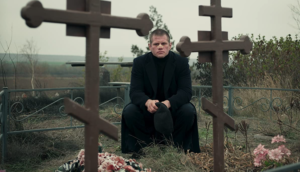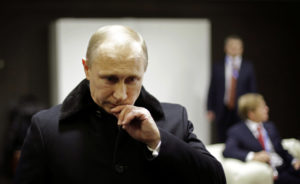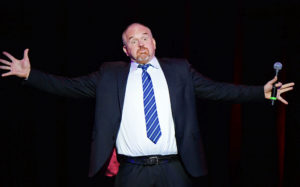Peter Cytanovic has become so accustomed to being hated that he rattles off some of the shocking messages he has received with the ease of going through a shopping list: “Why don’t you just kill yourself?”; “I’m going to come to Reno and kill you”; “Die Nazi scum.”
Nearly five years ago, on August 11, 2017, Cytanovic travelled to Charlottesville, Virginia, to attend the Unite the Right rally, a gathering of white nationalists including Klu Klux Klan members, neo-Nazis, and white supremacists. As night fell, the angry crowd marched and chanted racist and anti-Semitic slogans. Cytanovic was in the thick of it, holding a tiki-torch aloft as he screamed at counter-protesters. A photographer captured the moment. Soon, his picture was everywhere. “I was the face of white terror,” he tells me.
At the time, Cytanovic identified as a white nationalist, and held racist views: he supported the deportation of migrants and the creation of a white-only state. By the time I met him, in the summer of 2019, he had recanted. He was nearing the end of a Masters in Political Theory at the London School of Economics, volunteering with a counter-extremism organisation, and optimistic about how he could use his experiences to help others understand — and avoid — the draw of the extreme Right.
But his story raises difficult questions about how far a person must go to make amends, and whether efforts to silence people like him — however well-intentioned those efforts might be — help or hinder the battle to combat polarisation and extremism.
Cytanovic’s journey to radicalisation follows a familiar path at first. He was born into a working-class family in Reno, Nevada, in 1996. His mother was diagnosed with brain cancer while pregnant with him, and the cost of the treatment would leave the family crippled by a lifetime of debt. His father lost his job as a bookie when a foreign company bought the casino where he worked. Still, Cytanovic graduated from high school with good grades and began studying politics at the University of Nevada.
It was a difficult transition. Cytanovic says he felt a gulf between himself and the generally richer students, particularly as his conservative Catholic views clashed with those of his more socially liberal peers. During his early years at college, he felt dismissed as “white trash”, although he also admits that he often acted like “a genuine asshole”.
He was drawn to Donald Trump because he seemed to understand the frustrations of poor white communities. Then he began to spend increasing amounts of time watching alt-Right content on YouTube — “trying to find myself” — and soon found himself down rabbit holes of his own biases, now amplified and distorted by the social media algorithms that were offering up ever more extreme-Right content.
Cytanovic eventually joined Identity Evropa, which the Southern Poverty Law Center says was, at the time, “at the forefront of the racist ‘alt-right’s’ effort to recruit white, college-aged men and transform them into the fashionable new face of white nationalism”. They were one of the organisers of the Unite the Right rally in Charlottesville, and while Cytanovic says he was never anti-Semitic, he was fully aware of the presence of neo-Nazis at the march.
I have quizzed Cytanovic at length about what he believed when he attended the rally and how his views have changed (he has since apologised for his actions and worked with organisations countering hate to try to make amends). I have also spoken to counter-extremism and de-radicalisation experts who have worked alongside him over the past five years. I am confident that he is not a neo-Nazi or a white nationalist.
But that doesn’t mean his transformation has been total. In the immediate aftermath of the rally, Cytanovic was unrepentant, giving interviews about his white nationalist beliefs. The first seeds of doubt were sown when he befriended a young Muslim-American woman affiliated with the Democrat Party: she challenged his views without insulting him, allowing him to understand the hurt he had caused.
“I give her the most credit for being the most patient, for really allowing me to calm down, to loosen up, to realise that I didn’t need to be so defensive and start to really think about everything,” he says. “I don’t think there was a day when I suddenly said, I want to make amends. It developed over time as I realised how wrong I was.”
Still, his expressions of regret are often countered by self-justifications; he can swing from showing genuine awareness that his past views were racist, to defensive outbursts on issues like migration. He gets agitated when he feels like his socially conservative beliefs are under attack, or when they are equated with the views of the neo-Nazis. An interview with LSE’s student newspaper in Spring 2019, in which he wanted to apologise for attending the Charlottesville rally, backfired when he made derogatory remarks about trans people while trying to explain his Catholic beliefs.
If we are serious about countering radicalisation, though, we do need to pay attention to people like Cytanovic, because his messy and complicated retreat from the extreme reflects the reality of increasing numbers of people across the world. It also poses difficult questions about the consequences far-Right extremists should face. Soon after Charlottesville, the FBI questioned Cytanovic and decided to take no action against him; his judgement lies in the hands of society.
When studying in London he felt like a chance of redemption was within his grasp. He volunteered at Groundswell, a community organisation aimed at countering extremism by building bridges between different groups. But since he returned to Reno, later in 2019, Cytanovic has been struggling to see a future for himself.
He has been unable to find a job outside factory work. When he does find work, he is routinely fired when his past is unearthed. No university will accept him for further study. Even efforts to volunteer at community or religious organisations are turned down. Institutions and groups are, understandably, reluctant to associate with him.
Meanwhile, as well as receiving death threats, he is still insulted on the street, and bombarded with hate mail. When he tried to join the National Guard, media reports framed it as an attempt by the far-Right to infiltrate the military. All of which leaves him in a Catch-22 situation: “No one ever believes I have good intentions. I’m a Nazi until proven otherwise, but I can’t get the opportunity to prove I’m not.”
Who cares? That’s the question people often ask when I talk to them about Cytanovic, who is one of eight former extremists featured in my book Far Out: Encounters with Extremists. Why should anyone care that a man who openly and knowingly marched alongside the KKK is struggling to build a normal life?
It’s an important question to ask. In the aftermath of Trump’s election, there was a shift in media coverage: many outlets profiled Americans with white nationalist ideologies in an effort to understand the mainstreaming of racist beliefs. But such stories often missed the mark, portraying the “neo-Nazi next door” without offering much insight into the hugely complex radicalisation process. And some unwittingly caused harm by giving a platform to extremist views.
Now there has been a swing in the other direction, illustrated by a headline a few years ago: ‘We Need to Stop Humanising Neo-Nazis’. Attempts to explore the human motives for extremism are now often considered taboo. Coverage is expected to be outright condemnatory, rather than focused on the potential for rehabilitation.
Since meeting Cytanovic, I have tried to publish articles about him at points when his story seemed relevant — with the election of Joe Biden, for example, when the US might have been seeking solutions to a large radicalised population. Publications would initially be enthusiastic, before deciding not to pursue the story. Reasons given included that Cytanovic was undeserving of any media coverage.
The focus has shifted now from victims of extremism — which, in many ways, is a good thing. But we’re in danger of oversimplifying the perpetrators. When it comes to their stories, the world wants black-and-white tales of complete U-turns, even when they misunderstand the complexities of de-radicalisation or raise questions about their authenticity. Two organisers of the Charlottesville rally, for example, claimed to have reformed and started a counter-extremism group. Their apparently miraculous conversions earned much media coverage, despite accusations that they were just trying to clean up their images as they faced lawsuits over the Charlottesville violence.
Cytanovic’s attempts at honesty seem to be his undoing. While at times his motives can veer towards self-serving — like most people’s — it is also clear that he has interrogated his past beliefs and is genuinely seeking to help others, while remaining authentic to his religious framework. And if people are serious about countering extremism, it’s important to understand the nuance of de-radicalisation. Cytanovic’s frankness offers an important insight into that process — and provides clues for those planning interventions that can bring people back from the brink.
That’s why we need to have the courage to explore difficult and controversial aspects of de-radicalisation in the media — and understand that while these stories will never be simple, they cannot simply be erased.
By eternally excluding him, society runs a risk. Feelings of alienation and isolation can help drive people to extreme groups, so marginalising anyone attempting to reject those groups is likely to eventually backfire. It could lead people to return to hate groups, and enable re-radicalisation.
Right now, Cytanovic shows no sign of returning to the far-Right. He says he wants to make a positive difference in the world, and has become an advocate for labour rights. This should come as a relief. He is an intelligent young man and a persuasive speaker with a comprehensive knowledge of political theory. Had he remained with the far-Right, he could have employed those skills to become a potent propaganda tool and recruiter — or even a leader — for the movement.
That’s not to say Cytanovic isn’t ultimately responsible for his own actions. It’s essential that he recognises the consequences of those actions will be long-lasting; making amends for harm done is a lifetime’s commitment. But there also must be opportunities for atonement, whether that be through state-assisted volunteering programmes or community initiatives like Groundswell. Because if we deny people the chance to try being better, we risk perpetuating the cycle of extremism.
Disclaimer
Some of the posts we share are controversial and we do not necessarily agree with them in the whole extend. Sometimes we agree with the content or part of it but we do not agree with the narration or language. Nevertheless we find them somehow interesting, valuable and/or informative or we share them, because we strongly believe in freedom of speech, free press and journalism. We strongly encourage you to have a critical approach to all the content, do your own research and analysis to build your own opinion.
We would be glad to have your feedback.
Source: UnHerd Read the original article here: https://unherd.com





